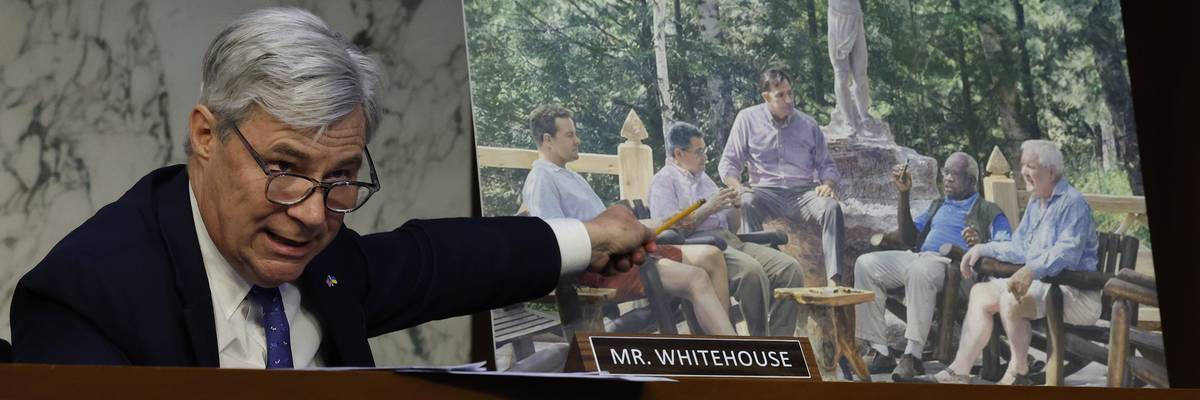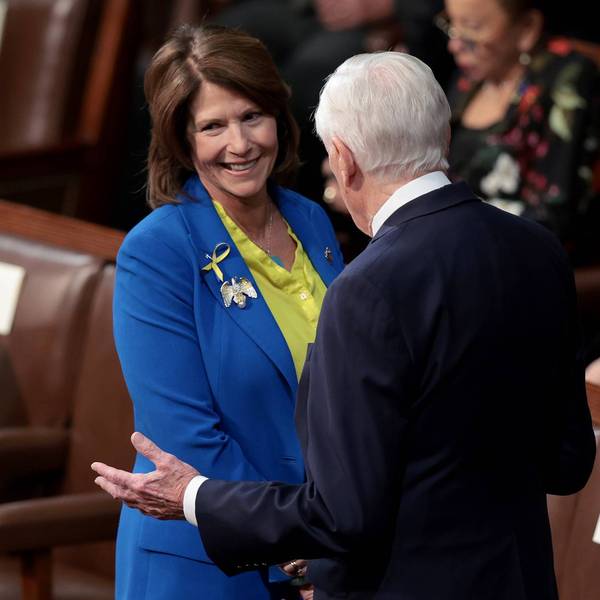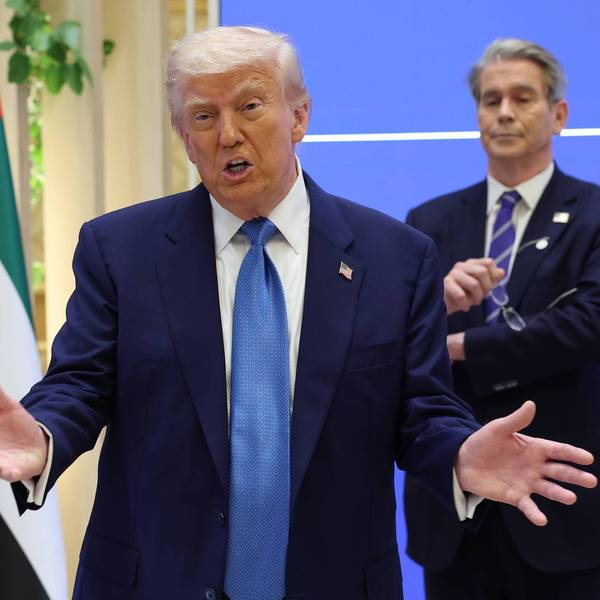
Sen. Sheldon Whitehouse (D-R.I.) displays a copy of a painting featuring Supreme Court Justice Clarence Thomas and other right-wing figures during a hearing on May 2, 2023.
Dems Push Right-Wing Billionaires for Info on All Their Gifts to Supreme Court Justices
Sens. Sheldon Whitehouse and Dick Durbin demanded details from "court fixer" Leonard Leo and two billionaires who were featured in recent reporting on Justice Samuel Alito.
A pair of Senate Democrats on Wednesday pressed Federalist Society co-chair Leonard Leo and two right-wing billionaires to provide a detailed accounting of all gifts and hospitality they've provided to U.S. Supreme Court justices over the years, a demand that came amid a steady stream of revelations indicating rampant corruption on the high court.
In separate letters to Leo, hedge fund tycoon Paul Singer, and real estate magnate Robin Arkley, Sens. Sheldon Whitehouse (D-R.I.) and Dick Durbin (D-Ill.) requested specific information on the roles the three played in organizing a 2008 Alaska fishing trip that Supreme Court Justice Samuel Alito attended.
Alito did not disclose the trip, which was first reported last month by the investigative outlet ProPublica.
"The reporting stated that you 'attended and helped organize' this event, invited Justice Alito and Paul Singer to attend, and asked Mr. Singer if you and Justice Alito could fly to Alaska on a private jet owned by Mr. Singer, or an entity he owns or controls," Whitehouse and Durbin, the chair of the Senate Judiciary Committee, wrote in their letter to Leo, who is notorious for orchestrating the right-wing takeover of the U.S. court system.
"Additionally, the free lodging for this trip was provided by Robin Arkley II, who has helped fund an advocacy group connected to you that has advocated for issues related to the federal judiciary. Justice Alito did not disclose these gifts of transportation and lodging on his annual financial disclosure form for 2008," the senators continued. "This follows earlier reporting indicating that you also joined at least one of Justice [Clarence] Thomas' undisclosed trips to Harlan Crow's Topridge Camp."
Crow, a billionaire and source of funding for right-wing dark money groups, has stonewalled the Senate Finance Committee's efforts to obtain further details about his many gifts to Thomas, which were also reported by ProPublica.
In their letters to Leo, Singer, and Arkley, Whitehouse and Durbin called on the three to turn over "an itemized list of all gifts, payments, and items of value exceeding $415 given by you, or by entities you own or control or for which you have served as a partner, director, or officer, to any justice of the Supreme Court or a member of the justice's family, including the name of the Justice, the approximate dollar amount of each item, and the date it was extended."
The senators also asked for "an itemized list of all transportation or lodging provided, whether by you; by entities you own or control or for which you have served as a partner, director, or officer; or by others, to a justice of the Supreme Court or a member of the justice's family, which you had a role in facilitating or arranging."
"Answers to these questions will help the committee's work to create reliable ethics guardrails at the court, under Congress' clearly established oversight and legislative authority."
Whitehouse and Durbin's sent the letters days after they announced that on July 20, the Senate Judiciary Committee will mark up and vote on the Rhode Island senator's Supreme Court Ethics, Recusal, and Transparency Act, a bill that would force the high court to adopt a binding code of conduct and strengthen disclosure requirements, among other reforms.
In a series of tweets on Wednesday, Whitehouse wrote that congressional action is necessary given that Chief Justice John Roberts "has barely acknowledged, much less investigated or sought to fix, the ethics crises swirling around our highest court," which has been busy gutting abortion rights, clean water protections, affirmative action, and more.
Earlier this year, Roberts declined Durbin's invitation to testify before the Senate Judiciary Committee in the wake of ProPublica's reporting on the luxury trips Thomas has taken on Crow's dime.
"Senator Durbin and I are demanding more information on gifts given to Supreme Court justices by right-wing court fixer Leonard Leo and two right-wing billionaires implicated in recent reporting on the court's ethics crisis," Whitehouse wrote Wednesday. "Answers to these questions will help the committee's work to create reliable ethics guardrails at the court, under Congress' clearly established oversight and legislative authority."
An Urgent Message From Our Co-Founder
Dear Common Dreams reader, The U.S. is on a fast track to authoritarianism like nothing I've ever seen. Meanwhile, corporate news outlets are utterly capitulating to Trump, twisting their coverage to avoid drawing his ire while lining up to stuff cash in his pockets. That's why I believe that Common Dreams is doing the best and most consequential reporting that we've ever done. Our small but mighty team is a progressive reporting powerhouse, covering the news every day that the corporate media never will. Our mission has always been simple: To inform. To inspire. And to ignite change for the common good. Now here's the key piece that I want all our readers to understand: None of this would be possible without your financial support. That's not just some fundraising cliche. It's the absolute and literal truth. We don't accept corporate advertising and never will. We don't have a paywall because we don't think people should be blocked from critical news based on their ability to pay. Everything we do is funded by the donations of readers like you. Will you donate now to help power the nonprofit, independent reporting of Common Dreams? Thank you for being a vital member of our community. Together, we can keep independent journalism alive when it’s needed most. - Craig Brown, Co-founder |
A pair of Senate Democrats on Wednesday pressed Federalist Society co-chair Leonard Leo and two right-wing billionaires to provide a detailed accounting of all gifts and hospitality they've provided to U.S. Supreme Court justices over the years, a demand that came amid a steady stream of revelations indicating rampant corruption on the high court.
In separate letters to Leo, hedge fund tycoon Paul Singer, and real estate magnate Robin Arkley, Sens. Sheldon Whitehouse (D-R.I.) and Dick Durbin (D-Ill.) requested specific information on the roles the three played in organizing a 2008 Alaska fishing trip that Supreme Court Justice Samuel Alito attended.
Alito did not disclose the trip, which was first reported last month by the investigative outlet ProPublica.
"The reporting stated that you 'attended and helped organize' this event, invited Justice Alito and Paul Singer to attend, and asked Mr. Singer if you and Justice Alito could fly to Alaska on a private jet owned by Mr. Singer, or an entity he owns or controls," Whitehouse and Durbin, the chair of the Senate Judiciary Committee, wrote in their letter to Leo, who is notorious for orchestrating the right-wing takeover of the U.S. court system.
"Additionally, the free lodging for this trip was provided by Robin Arkley II, who has helped fund an advocacy group connected to you that has advocated for issues related to the federal judiciary. Justice Alito did not disclose these gifts of transportation and lodging on his annual financial disclosure form for 2008," the senators continued. "This follows earlier reporting indicating that you also joined at least one of Justice [Clarence] Thomas' undisclosed trips to Harlan Crow's Topridge Camp."
Crow, a billionaire and source of funding for right-wing dark money groups, has stonewalled the Senate Finance Committee's efforts to obtain further details about his many gifts to Thomas, which were also reported by ProPublica.
In their letters to Leo, Singer, and Arkley, Whitehouse and Durbin called on the three to turn over "an itemized list of all gifts, payments, and items of value exceeding $415 given by you, or by entities you own or control or for which you have served as a partner, director, or officer, to any justice of the Supreme Court or a member of the justice's family, including the name of the Justice, the approximate dollar amount of each item, and the date it was extended."
The senators also asked for "an itemized list of all transportation or lodging provided, whether by you; by entities you own or control or for which you have served as a partner, director, or officer; or by others, to a justice of the Supreme Court or a member of the justice's family, which you had a role in facilitating or arranging."
"Answers to these questions will help the committee's work to create reliable ethics guardrails at the court, under Congress' clearly established oversight and legislative authority."
Whitehouse and Durbin's sent the letters days after they announced that on July 20, the Senate Judiciary Committee will mark up and vote on the Rhode Island senator's Supreme Court Ethics, Recusal, and Transparency Act, a bill that would force the high court to adopt a binding code of conduct and strengthen disclosure requirements, among other reforms.
In a series of tweets on Wednesday, Whitehouse wrote that congressional action is necessary given that Chief Justice John Roberts "has barely acknowledged, much less investigated or sought to fix, the ethics crises swirling around our highest court," which has been busy gutting abortion rights, clean water protections, affirmative action, and more.
Earlier this year, Roberts declined Durbin's invitation to testify before the Senate Judiciary Committee in the wake of ProPublica's reporting on the luxury trips Thomas has taken on Crow's dime.
"Senator Durbin and I are demanding more information on gifts given to Supreme Court justices by right-wing court fixer Leonard Leo and two right-wing billionaires implicated in recent reporting on the court's ethics crisis," Whitehouse wrote Wednesday. "Answers to these questions will help the committee's work to create reliable ethics guardrails at the court, under Congress' clearly established oversight and legislative authority."
- Calls for Clarence Thomas Impeachment Vote After Report Exposes Billionaire-Funded Trips ›
- Thomas' Citizens United Vote Enabled Billionaire Benefactor to Boost Political Power ›
- Billionaire Harlan Crow Also Bankrolled GOP Lawmakers Blocking SCOTUS Ethics Reform ›
- Database Reveals 'Staggering' $6.6 Million in Gifts to Supreme Court Justices | Common Dreams ›
A pair of Senate Democrats on Wednesday pressed Federalist Society co-chair Leonard Leo and two right-wing billionaires to provide a detailed accounting of all gifts and hospitality they've provided to U.S. Supreme Court justices over the years, a demand that came amid a steady stream of revelations indicating rampant corruption on the high court.
In separate letters to Leo, hedge fund tycoon Paul Singer, and real estate magnate Robin Arkley, Sens. Sheldon Whitehouse (D-R.I.) and Dick Durbin (D-Ill.) requested specific information on the roles the three played in organizing a 2008 Alaska fishing trip that Supreme Court Justice Samuel Alito attended.
Alito did not disclose the trip, which was first reported last month by the investigative outlet ProPublica.
"The reporting stated that you 'attended and helped organize' this event, invited Justice Alito and Paul Singer to attend, and asked Mr. Singer if you and Justice Alito could fly to Alaska on a private jet owned by Mr. Singer, or an entity he owns or controls," Whitehouse and Durbin, the chair of the Senate Judiciary Committee, wrote in their letter to Leo, who is notorious for orchestrating the right-wing takeover of the U.S. court system.
"Additionally, the free lodging for this trip was provided by Robin Arkley II, who has helped fund an advocacy group connected to you that has advocated for issues related to the federal judiciary. Justice Alito did not disclose these gifts of transportation and lodging on his annual financial disclosure form for 2008," the senators continued. "This follows earlier reporting indicating that you also joined at least one of Justice [Clarence] Thomas' undisclosed trips to Harlan Crow's Topridge Camp."
Crow, a billionaire and source of funding for right-wing dark money groups, has stonewalled the Senate Finance Committee's efforts to obtain further details about his many gifts to Thomas, which were also reported by ProPublica.
In their letters to Leo, Singer, and Arkley, Whitehouse and Durbin called on the three to turn over "an itemized list of all gifts, payments, and items of value exceeding $415 given by you, or by entities you own or control or for which you have served as a partner, director, or officer, to any justice of the Supreme Court or a member of the justice's family, including the name of the Justice, the approximate dollar amount of each item, and the date it was extended."
The senators also asked for "an itemized list of all transportation or lodging provided, whether by you; by entities you own or control or for which you have served as a partner, director, or officer; or by others, to a justice of the Supreme Court or a member of the justice's family, which you had a role in facilitating or arranging."
"Answers to these questions will help the committee's work to create reliable ethics guardrails at the court, under Congress' clearly established oversight and legislative authority."
Whitehouse and Durbin's sent the letters days after they announced that on July 20, the Senate Judiciary Committee will mark up and vote on the Rhode Island senator's Supreme Court Ethics, Recusal, and Transparency Act, a bill that would force the high court to adopt a binding code of conduct and strengthen disclosure requirements, among other reforms.
In a series of tweets on Wednesday, Whitehouse wrote that congressional action is necessary given that Chief Justice John Roberts "has barely acknowledged, much less investigated or sought to fix, the ethics crises swirling around our highest court," which has been busy gutting abortion rights, clean water protections, affirmative action, and more.
Earlier this year, Roberts declined Durbin's invitation to testify before the Senate Judiciary Committee in the wake of ProPublica's reporting on the luxury trips Thomas has taken on Crow's dime.
"Senator Durbin and I are demanding more information on gifts given to Supreme Court justices by right-wing court fixer Leonard Leo and two right-wing billionaires implicated in recent reporting on the court's ethics crisis," Whitehouse wrote Wednesday. "Answers to these questions will help the committee's work to create reliable ethics guardrails at the court, under Congress' clearly established oversight and legislative authority."
- Calls for Clarence Thomas Impeachment Vote After Report Exposes Billionaire-Funded Trips ›
- Thomas' Citizens United Vote Enabled Billionaire Benefactor to Boost Political Power ›
- Billionaire Harlan Crow Also Bankrolled GOP Lawmakers Blocking SCOTUS Ethics Reform ›
- Database Reveals 'Staggering' $6.6 Million in Gifts to Supreme Court Justices | Common Dreams ›

